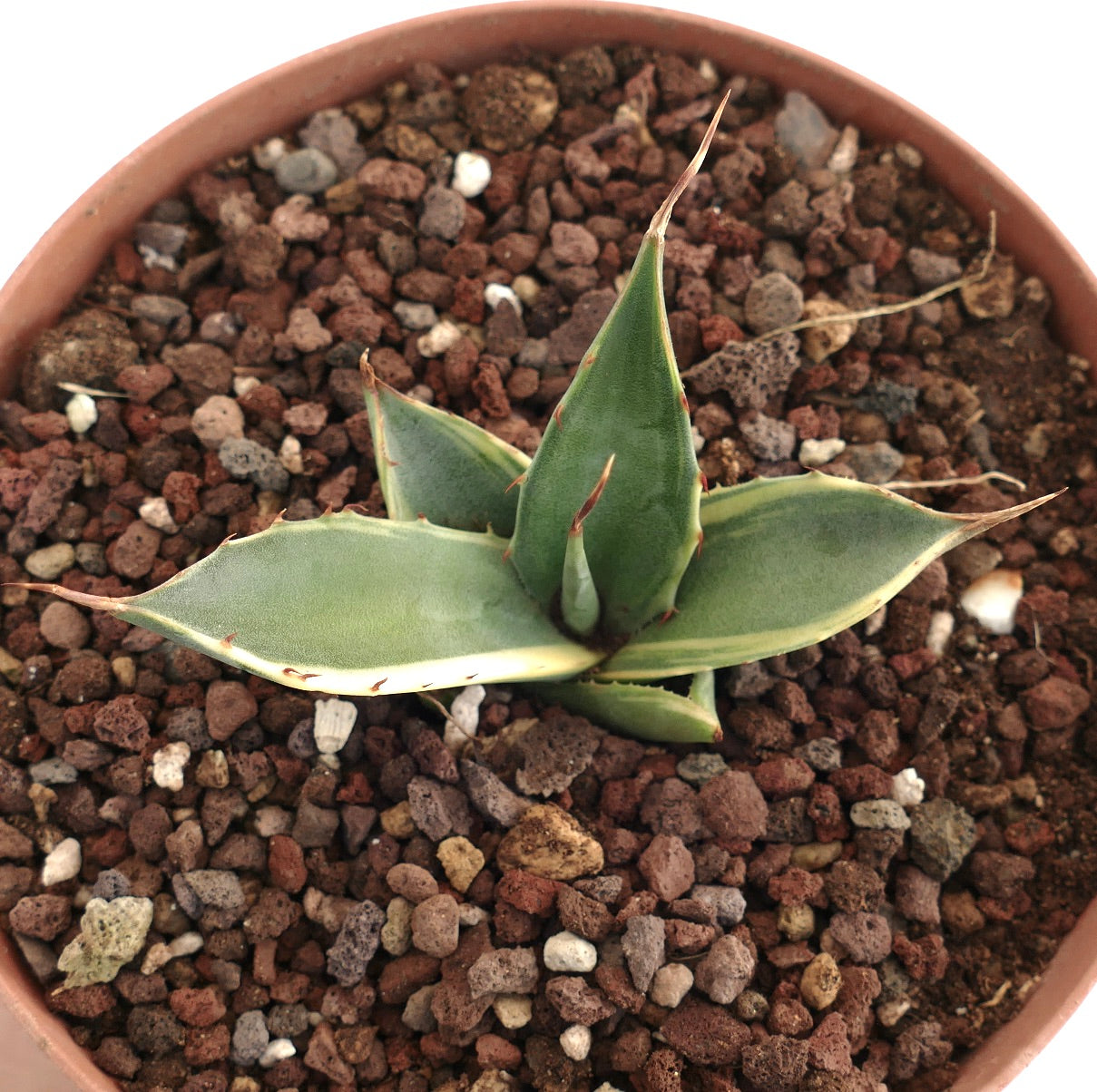- Sigle Specimen
Agave asperrima VARIEGATED COZ
Agave asperrima VARIEGATED COZ
Couldn't load pickup availability
Product Description
Agave asperrima VARIEGATED, also known as the Rough Agave or Maguey Liso, is a striking and ornamental variety of the Agave asperrima species. The variegation adds a unique aesthetic appeal to the plant. Here is a description and some cultivation tips:
Description
- Origin: Native to northeastern Mexico.
- Appearance: This agave is characterized by its rosette of thick, fleshy leaves. The variegated form includes streaks or margins of different colors, typically cream or yellow, contrasting with the green of the leaves.
- Leaves: The leaves are broad, rigid, and have a rough texture, hence the name "asperrima" meaning "very rough". They often have sharp spines on the margins and a terminal spine.
- Size: It can grow quite large, with rosettes reaching several feet in both height and width.
- Flowers: Like other agaves, it blooms once at the end of its life, sending up a tall flower stalk with yellow flowers.
- Growth Pattern: Slow-growing, this plant can take several years to reach maturity.
Cultivation Tips
-
Light: Requires full sun to partial shade. The variegation may become more pronounced with sufficient light.
-
Soil: Well-draining soil is crucial. Use a cactus or succulent mix or incorporate sand or gravel into regular potting soil.
-
Watering: Water moderately in the growing season and reduce in winter. Ensure the soil dries out between waterings to prevent root rot.
-
Temperature: It prefers warm conditions but is relatively cold-hardy compared to other agaves. It can withstand light frosts, but protection or moving it indoors in colder climates is advisable.
-
Fertilizing: Light fertilization during the growing season can be beneficial but is not essential.
-
Potting and Repotting: If grown in a container, ensure it is large enough to accommodate the root system and provides good drainage.
-
Pests and Diseases: Watch for common pests like agave snout weevil. Overwatering can lead to fungal diseases.
-
Propagation: Propagation is typically done through offsets or seed. Variegated traits might not always be passed through seeds, so propagation by offsets is preferable for maintaining variegation.
Special Considerations
- Variegation: The variegated forms are often more sensitive to harsh conditions than the non-variegated types. They may require more protection from extreme sun, cold, or water stress.
- Rarity: Variegated versions of Agave asperrima can be rare and sought after, making them a prized possession for collectors.
Remember, the key with Agave asperrima, especially the variegated form, is to avoid overwatering and to provide plenty of sunlight for optimal growth and variegation expression.
Agave hybrids are plant varieties resulting from the crossbreeding of different species or cultivars within the Agave genus. These hybrids are created by intentionally pollinating the flowers of one Agave species with the pollen of another, leading to offspring that carry genetic traits from both parent plants. Agave hybrids are popular among horticulturists, gardeners, and succulent enthusiasts for their unique and often desirable characteristics. Here are a few key points about Agave hybrids:
-
Variety in Appearance: Agave hybrids can exhibit a wide range of characteristics, including variations in size, color, texture, and leaf shape. These variations make them attractive choices for landscaping and ornamental gardening.
-
Hardiness: Some Agave hybrids are bred for increased cold hardiness or drought tolerance, making them suitable for a broader range of climates and growing conditions compared to their parent species.
-
Novel Features: Hybridization can result in the development of new and interesting features not found in the parent species. This may include unique color patterns, growth habits, or leaf structures.
-
Cultural Adaptability: Many Agave hybrids inherit the resilience and low-maintenance qualities of their parent plants, making them suitable for xeriscaping, arid gardens, and rock gardens.
-
Cultivation: Agave hybrids are typically propagated through offsets (pups) or by seed. They require well-draining soil and plenty of sunlight, and they are often drought-tolerant once established.
-
Popular Cultivars: Some well-known Agave hybrids include Agave 'Blue Glow' (a cross between Agave attenuata and Agave ocahui) and Agave 'Sharkskin' (a hybrid of Agave victoriae-reginae and Agave asperrima).
Agave hybrids offer a diverse array of choices for landscaping and succulent collections, combining the best traits of different Agave species to create visually appealing and resilient plants. Their popularity among plant enthusiasts continues to drive hybridization efforts, leading to the discovery of new and exciting Agave cultivars.
Please be aware that since the day we took pictures of this plant, the plant may have grown, and appear slightly different than what you saw portrayed.
Botanical family: Agavaceae
Botanical genus: Agave
Botanical species: Agave asperrima VARIEGATED
SKU:BA-1494-S
Cultivation
Cultivation
Info and Disclaimers
Info and Disclaimers
Plant Height:
Plant Diameter: 10cm
Pot Size:
Grafted/Not Grafted:
Picture take on:








